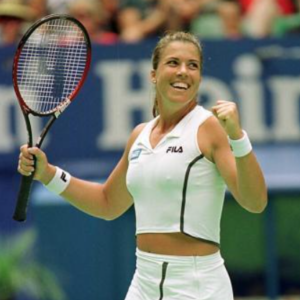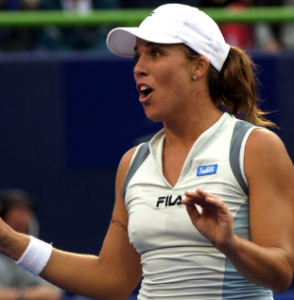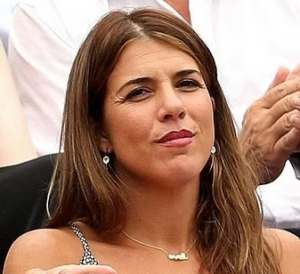The tale of Jennifer Capriati is one that underscores the importance of mental health in sports. Her journey from a child prodigy to a world-renowned tennis champion, and the struggles she faced along the way, serve as a reminder of the immense pressures that come with success
While Capriati eventually found her way back to the sport she loved, her story is a powerful example of the need for a more balanced approach to athlete development.
As society continues to prioritize mental health and well-being, Jennifer Capriati’s story will remain a poignant reminder of the human side of sports.
Jennifer Capriati’s story is one of triumph over adversity, a journey from the depths of despair to the heights of success.
Her struggles with mental health following her 1993 US Open loss were profound, but they did not define her.
Instead, she used those experiences to fuel her comeback, ultimately achieving the success that had once seemed so elusive. Capriati’s legacy is a testament to the power of resilience, and her story continues to inspire athletes and non-athletes alike to persevere in the face of life’s challenges.

Also Read: Pete Alonso Trade News: Astros Exploring Deal for the Star Slugger, Fishing and More
Table of Contents
Jennifer Capriati: Who Is She?
The Meteoric Rise of Jennifer Capriati
Jennifer Capriati’s journey in professional tennis is nothing short of extraordinary.1
A child prodigy, she burst onto the international tennis scene at the tender age of 13, immediately capturing the world’s attention. Born on March 29, 1976, in New York, Capriati was destined for greatness.
Her father, Stefano Capriati, was her primary coach and the driving force behind her early success. The pressure to succeed was immense, and while Capriati seemed to thrive under it initially, it eventually took a toll on her mental and emotional well-being.
The Early Years: A Prodigy in the Making
Capriati’s rise was swift and spectacular. She made her professional debut in 1990 at the age of 13 and quickly proved that she was no ordinary teenager. In her first Grand Slam appearance at the French Open, she reached the semifinals, an unprecedented achievement for someone so young.
Her powerful baseline game, coupled with her fearlessness on the court, made her a formidable opponent. The tennis world was abuzz with talk of Capriati being the next big thing, and she lived up to the hype by reaching two more Grand Slam semifinals and winning an Olympic gold medal at the 1992 Barcelona Games.
Never underestimate a champion who has won everything but the elusive gold medal to top it all. Peaked and executed his usual game perfectly at the right moment against a phenomenal player like Alcaraz who seemed unbeatable. Exciting to watch
— Jennifer Capriati (@JenCapriati) August 4, 2024
Despite her early success, the pressures of professional tennis began to weigh heavily on Capriati. The 1993 US Open marked a significant turning point in her career.
As the seventh seed, she was expected to perform well, but she suffered a shocking first-round defeat to the unheralded Leila Mekshi. The loss was a blow to her confidence and signaled the beginning of a downward spiral.
Capriati, who had been competing at the highest level since her early teens, was emotionally and physically exhausted. The constant pressure to win, coupled with the expectations placed on her by her coaches, family, and the media, became overwhelming.
The Hiatus: Escaping the Spotlight
After her disappointing performance at the US Open, Capriati made the difficult decision to take a break from tennis. At just 18 years old, she was burnt out and needed time away from the sport that had consumed her life.
During her hiatus, she sought refuge in typical teenage activities, which were a stark contrast to the disciplined life of a professional athlete. In an attempt to reclaim some semblance of normalcy, Capriati indulged in partying and other behaviors that were uncharacteristic of the focused and driven athlete the world had come to know.
One of the most publicized incidents during this period was a 36-hour party at a motel in Miami, which resulted in Capriati’s arrest on May 16, 1994, for a misdemeanor charge of marijuana possession.
The arrest was a wake-up call for many who had followed her career, revealing the immense pressure she had been under. It was a stark reminder that, despite her success, Capriati was still a teenager grappling with the same issues as her peers, albeit under a much brighter spotlight.

Jennifer Capriati: Mark Black’s Revelations
The Confession
In the aftermath of her arrest, Capriati’s friend Mark Black gave an interview to Sports Illustrated, shedding light on the reasons behind her hiatus.
Black revealed that Capriati had confided in him about the stress and pressure she felt to become the World No. 1 player. According to Black, while Capriati loved tennis, the constant push to be the best had become too much for her to handle.
He also highlighted the role of her father, Stefano Capriati, and her coaches, who were heavily involved in managing her career and, as a result, her life.
“They were running her life. Her dad. Her coaches. She didn’t make money just for herself. A lot of people were depending on her,” Black stated. This revelation was a poignant reminder of the immense burden that young athletes often carry.
For Capriati, tennis was no longer just a sport she loved; it had become a source of stress and a means to an end for those around her.
The Role of Her Support System: A Double-Edged Sword
- Jennifer Capriati’s story is a cautionary tale about the impact of external pressures on young athletes.
- While her father and coaches played a crucial role in her early success, their influence also contributed to the emotional and mental challenges she faced.
- Capriati’s former coach, Tommy Thompson, echoed similar sentiments in an interview. He pointed out that many people in Capriati’s life viewed her solely as a tennis player, not as a young woman with a multifaceted identity.
- This narrow perception, Thompson argued, was detrimental to her well-being.
- “When she had problems, people scattered. And I say we: coaches, parents, management groups. When I met her, she was the easiest, happiest kid I’ve ever known. She was carefree. After being on the tour for three years, I could see a change,” Thompson reflected.
- Thompson’s observations underscore the importance of a balanced support system for young athletes.
- While Capriati’s team was instrumental in her rise to fame, they were not adequately equipped to support her through the challenges that came with it.
- The intense focus on her tennis career left little room for Capriati to develop other aspects of her identity, leading to the burnout and disillusionment she experienced.
The Aftermath: Life Beyond Tennis
Jennifer Capriati’s decision to step away from tennis was both a courageous and necessary move. It allowed her to take a step back and reassess her life outside of the sport.
Her hiatus, while fraught with personal challenges, ultimately provided her with the space she needed to grow and heal. Capriati’s journey is a testament to the importance of mental health and well-being, particularly for young athletes who are thrust into the spotlight at a young age.
After several years away from the game, Capriati made a remarkable comeback in the late 1990s. She won three Grand Slam titles and finally achieved the World No. 1 ranking in October 2001.
Her return to the top of the tennis world was a testament to her resilience and determination. However, her career also serves as a reminder of the toll that professional sports can take on an individual’s mental and emotional health.

Also Read: Jose Mourinho Aims for Fenerbahce to Sign Barcelona Star, Transfer News and More
Also Read: Mitchell Marsh Brings Huge News for Australia Before T20 World Cup Super 8 Showdown with Bangladesh






